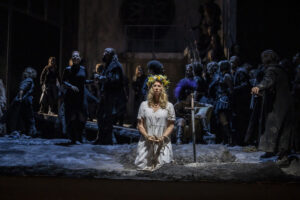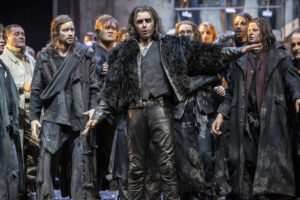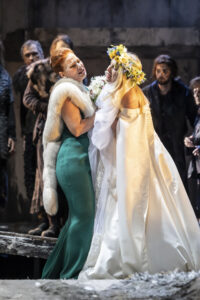That experience changed Thomas Mann’s life forever. He never recovered from the youthful rapture he experienced in Lübeck during a performance of Lohengrin. Less than four years later he began writing Buddenbrooks, a story of a wealthy merchant family from Lübeck. Perhaps of his own family, for it had been living in this free Hanseatic city since 1775. In Chapter Two of the eleventh part of the novel Mann seems to identify with the fifteen-year old Hanno Buddenbrook, who, as a reward for having bravely endured maltreatment in Herr Brecht’s dental surgery for several days, went with his mother to a performance of Lohengrin. He was not bothered by the fact that the orchestra’s mediocre violins proved disappointing already in the first bars of the prelude. He did not mind the fact that the fat tenor with a straw-coloured beard entered the stage in a bouncing boat. “The sweet, exalted splendour (…) had borne him away upon its wings”.
Echoes of those experiences can be heard also in Mann’s later masterpieces, disregarded by translators and literature scholars unfamiliar with Wagner. The two men with axes on their shoulders, whom Castorp from The Magic Mountain encounters during a stroll, bid each other “rustically formal” farewell of “Nun, so leb wohl und hab Dank!” – bringing to mind the first and last phrases in the parting between Lohengrin and the swan in Act I of the opera. In the next chapter Hans Castorp shares his rapture with Joachim, who is not especially interested in his musings: “I heard that up in the woods and I shall remember it all my life”.
Anna Gabler (Elsa). Photo: Jochen Quast
That theatre is no more. The performance so cherished by Mann took place in Lübeck’s Casinotheater in Beckergrube street, in a building erected in 1858 thanks to the efforts of a joint stock company made up of the city’s wealthy merchants and senators. The building – having a poorly built auditorium and not meeting fire safety requirements – was eventually closed at Easter 1905. A few months later the entrepreneur Emil Possehl, who owned two impressive tenement houses in Beckergrube, gave a generous donation to the construction of a new theatre – at the site of the demolished Casinotheater. The Bühnen der Hansestadt Lübeck opened three years later. The Art Nouveau building designed by Martin Dülfer, with its richly ornamented sandstone façade, underwent a thorough and meticulous renovation in the 1990s. Today it serves as a venue for theatrical, operatic and ballet productions as well as concerts of the local Philharmonic Orchestra, founded in 1897, and led in the past by artists like Hermann Abendroth, Wilhelm Furtwängler and Eugen Jochum. The Grossen Haus – with its stage comparable to that of Warsaw’s Teatr Dramatyczny and 800-seat auditorium – still regularly presents stagings of Wagner’s operas.
The first time I was driven to Lübeck was over five years ago, when I went there to see a performance of The Flying Dutchman under Anthony Negus’ inspired baton. This year I decided to see the Lübeck Lohengrin, if only because of my love for Thomas Mann’s oeuvre. “Who believes in Monday, when he is to hear Lohengrin on Sunday evening,” thought Hanno Buddenbrook. It so happened that the farewell performance of the new production by the Cyprian-Irish director Anthony Pilavachi took place precisely on a Sunday.
Pilavachi, a graduate of the Guildhall School of Music & Drama, has been living in Germany for nearly forty years and this is where his stage career began. He has directed over one hundred operatic productions, mainly in Germany as well as in Austria, Switzerland and Scandinavian countries, among others. He has particularly strong ties with the Lübeck theatre, where in 2007 he undertook to stage the entire Ring (which was later recorded on DVD and which won the prestigious ECHO-Klassik prize in 2012), and subsequently receive glowing reviews for his new productions of Parsifal and Tristan und Isolde. Pilavachi’s is a wise and very coherent Regietheater, focused in particular on Personenregie, the solid foundations of which he built at the London school.
Anton Keremidtchiev (Telramund). Photo: Jochen Quast
His catastrophic vision of Lohengrin differs fundamentally from the fashionable “post-apo” stagings of recent seasons. The world presented in it has not been violently destroyed. There are no smouldering ruins or fading ashes in this staging. Instead, there is a glass wall and untouched façade of some Gothic building – most likely a church – with a traceried rosette glaring in the middle like Sauron’s eye (splendid set design by Tatjana Ivschina, spectacularly lit by Falk Hampel). And all this is drenched in mud: piling up on the proscenium as if after an avalanche descended among artificial reservoirs collecting industrial waste, sticking to the Brabantians’ rags, staining the wedding tablecloths. It is hard not to have the impression that Pilavachi unfolds before us not so much a landscape after a battle, but a picture of a slow decay of civilisation, loss of meaning, crisis of all feelings and values. Who knows, perhaps this is a result of postmodern games with tradition, when desacralised medieval abbeys were encased in fanciful acrylic structures, and dilapidated churches were replaced with soulless glass and steel impersonations.
Pilavachi destroys the spectators’ illusions already in the Prelude to Act One. Ortrud will not charm Gottfried. She will cut his throat, break the swan’s neck and throw both bodies into a dungeon – with the tacit complicity of Telramund, horrified by her cruelty and determination. Lohengrin will appear on stage amid flashes and thunders: in a tacky wedding dinner jacket, as ill-suited to the situation as Elsa’s white dress and her floral wreath, as if taken straight from the Swedish Midsommar rites. Telramund’s henchmen resemble a bunch of homeless punks and drug addicts from some German hub station. King Henry the Fowler’s retinue – a band of nouveau-riche parvenus clad in cloth of gold and obscenely expensive furs. There are no heroes: there is only manipulation, politics and Elsa’s naive belief that it is enough to call the alleged saviour from Monsalvat for everything to end well.
Nothing will end well, as Pilavachi warns us throughout the narrative, bringing on stage again and again the dead Gottfried, who always appears with the sound of the Frageverbot motif (later invoked by a number of composers, beginning with Tchaikovsky’s Swan Lake and ending with Richard Stauss’ works). A dead child walks across the stage, throwing swan feathers like flowers during a Corpus Christi procession. Of no use are the efforts of Lohengrin, Wagner’s metaphor of an artist for the age, a genius whose inspiration will save nineteenth-century society, and who is granted royal protection as an advocate of popular monarchy. Elsa will fall victim to thugs. Lohengrin’s departure will open the tomb of the boy with the swan, from which will emerge a ghostly shadow of Gottfried in medieval armour, extending his hand with a quite modern unlocked grenade. The silence after the last chord will be broken by a scream followed by darkness, which after a moment will spur the shocked audience to break into prolonged applause.
Bea Robein (Ortrud) and Anna Gabler. Photo: Jochen Quast
Initially, the director had a very different Lohengrin in mind – angelic, ethereal, in the person of a singer who, judging by the available recordings, would have turned out to be at best a decent Evangelist in one of Bach’s Passions. Just before last September’s premiere, Pilavachi quarrelled with the music director of the production and new boss of the Philharmonisches Orchester der Hansestadt Lübeck, the Austrian conductor Stefan Vladar. After much turbulence Lohengrin was entrusted to Peter Wedd, known to Warsaw music lovers, and Elsa to the German soprano Anna Gabler. Another change happened before the last performance: the main protagonists were sung by Lena Kutzner and Magnus Vigilius, who had sung Elsa and Lohengrin at the Staatstheater Meiningen a year before. It is hard for me to say to what extent both artists followed Pilavachi’s instructions and to what extent they transferred to the Lübeck theatre the suggestions of Ansgar Haag, the director of the Meiningen production. But I do know that the youthful freshness of Kutzner’s interpretation – combined with her luminous, honeyed Jungendlich dramatischer Sopran – made her unexpectedly the brightest star of the evening. Less musical, the Dane Magnus Vigilius was inferior to her also in purely expressive terms: his Lohengrin followed the quite ahistorical convention of a stranger from nowhere and going nowhere. Endowed with a healthy and beautiful voice, impeccable intonation-wise, Vigilius was nevertheless unable to present a complete picture of this multidimensional character. As I had predicted, Anton Keremidtchiev, the Bolognese Dutchman from the second cast of the production conducted by Oksana Lyniv, proved to be an excellent Telramund. This time, under Vladar’s sensitive direction, he was not overwhelmed by the orchestra. Until the end of Act III he found a worthy partner in Bea Robein as Ortrud, a phenomenal actor and decent singer, who – unfortunately – lacked the top notes in the final “Dank, dass den Ritter du vertrieben!”. I find it difficult to judge Rúni Brattaberg, battling against a long indisposition, in the role of Henry the Fowler. Brattaberg retained all the qualities of his sonorous bass at the lower end of the scale, but clearly struggled with the sound matter in the high, often forcefully produced sections of the role. On the other hand it was a great pleasure to listen to the beautiful, rich baritone of Jacob Scharfman (Herald), who not only excelled musically, but also performed the complex acting tasks entrusted to him by Pilavachi with extraordinary sensitivity.
A separate mention should be made of the excellent chorus under Jan-Michael Krüger as well as the orchestra under Stefan Vladar, who conducted the entire performance with fervent enthusiasm, applying logically varied tempos, highlighting the soloists’ assets and covering their occasional shortcomings. I heard that up in Lübeck and I shall remember it for a long time. I felt like Hanno Buddenbrook: after the Sunday performance of Lohengrin I found it difficult to believe that it was Monday the following day.



